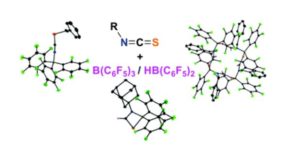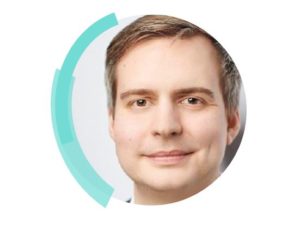Malte Fischer recently published his first article as a corresponding author with ChemComm. We wanted to celebrate this exciting milestone by finding out more about Malte and his research. Check out his #ChemComm1st article: B(C6F5)3- and HB(C6F5)2-mediated transformations of isothiocyanates.
We asked Malte a few questions about his experience in the lab and working with ChemComm. Read more below.
What are your main areas of research and what motivated you to take this direction?
I would like to summarize the research I am doing and I am interested in, simply under the term “synthetic chemistry”. Specifically, I mean research within the interfaces of organic chemistry, main group chemistry and organometallic chemistry. I am enthusiastic about the progress – especially in recent years – in synthesis, method development and in the search for applications for new molecules. I am convinced that there will always be a need for effective synthesis routes to access unusual and new molecules and I very much hope that I can contribute to this.
Can you set this article in a wider context?
The article is settled in main group chemistry. During my PhD I became more and more interested in this exciting field of research. Based on the reported results I will continue the research in this field.
What do you hope you and your research can achieve in the coming year?
Despite this difficult time, I am simply looking forward to going back to the laboratory at some point to continue having fun in doing research.
Describe your journey to becoming an independent researcher.
I think the moment when I was able to synthesize and characterize my first molecule unknown in literature (happened during my bachelor thesis) inspired me so much that since then I have had the goal of doing independent research and realizing my own ideas. I am definitely still in the beginning of becoming an independent researcher and I am currently working on laying the foundation for it – and this work has given me a lot of pleasure so far.
What is the best piece of advice you have ever been given?
The best advice was given to me by my parents and I try to live by it as much as possible: Pursue what interests you most and captivates you – the rest will come naturally.
Why did you choose to publish in ChemComm?
ChemComm simply stands for publications of the highest quality and with a large readership from all chemistry sub-disciplines. I am immensely pleased to have become a small part of this journal with my first publication as the corresponding author.
Malte’s Bio:
The publication ‘B(C6F5)3- and HB(C6F5)2-Mediated Transformations of Isothiocyanates’ originates from the phase as a research scientist within the group of Prof. Beckhaus in Oldenburg.
05/2019 – 02/2020 Research Scientist/ PostDoc – Carl von Ossietzky University Oldenburg, Germany. Supervisor: Prof. Dr. Rüdiger Beckhaus
10/2015 – 05/2019 PhD in Chemistry. Carl von Ossietzky University Oldenburg, Germany. Supervisor: Prof. Dr. Rüdiger Beckhaus
10/2013 – 10/2015 Master of Science in Chemistry
10/2010 – 10/2013 Bachelor of Science in Chemistry
Find Malte on Twitter: @FiMalte












